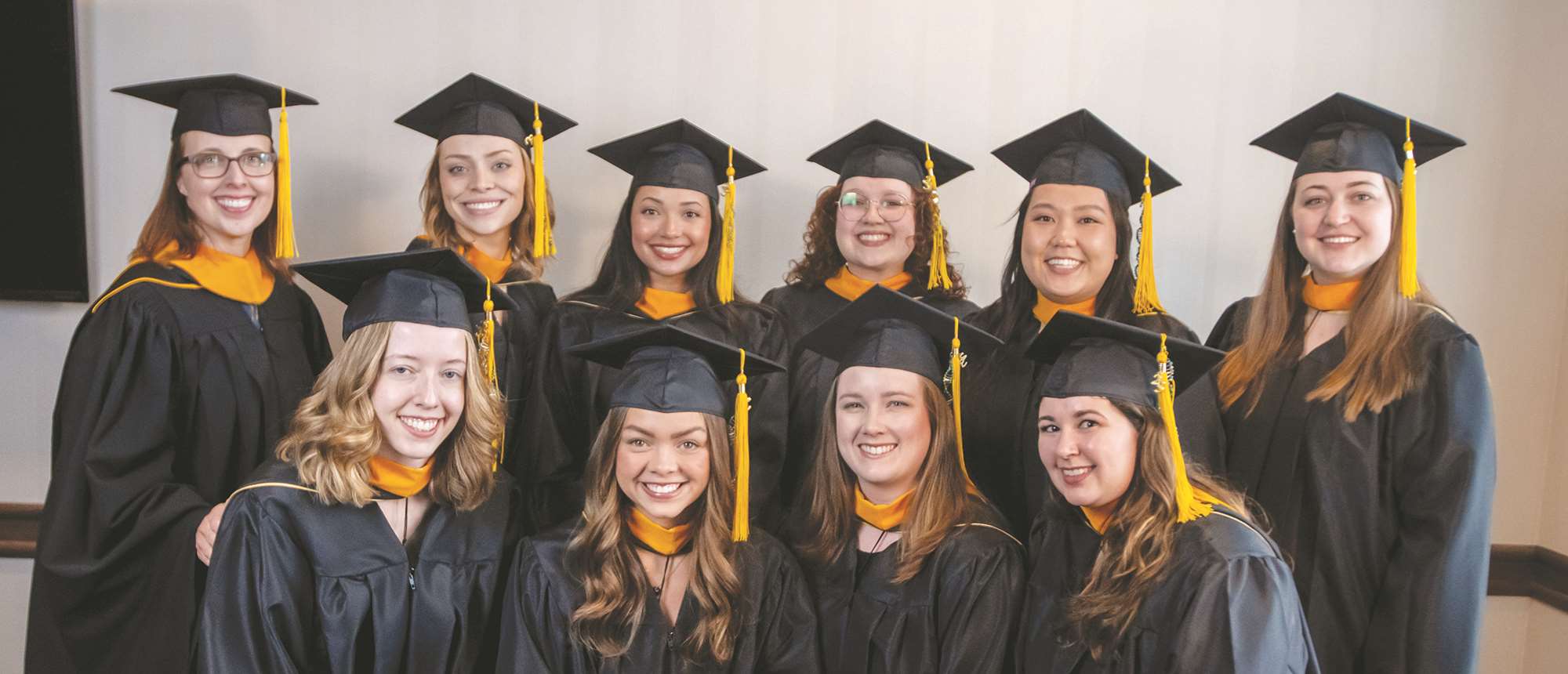Master of Science in Genetic Counseling Program Graduates First Class

Jennifer Geurts, MS, CGC (top left), with the inaugural MSGC graduating class in May 2023. Front row (l-r): Lizzie Mealey, Anna Ferrigan, Julia Carlson and Sarah Fittanto. Back row (l-r): Geurts, Emma Carlton, Siomara Santana, Phebe Lemert, Erica Her and Katie Schwobe.
The availability of genetic tests has increased significantly in recent years, creating an increased demand for genetic counselors. Genetic tests identify errors or mutations in a person’s DNA that might cause disease and enable the patient and their provider to know what conditions the patient is at risk of developing. The provider can then build a more personalized treatment plan based around that risk, and the patient can reduce the modifiable risk factors associated with that condition.
Genetic testing is not for everyone, however. As members of the healthcare team, genetic counselors work with patients to determine when genetic testing is appropriate, counsel them on the scientific, emotional and ethical implications of genetic testing and, if patients undergo testing, help interpret the results.
To help fill the demand for genetic counselors in Wisconsin (which has only about half of the number of genetic counselors needed to adequately support demand), MCW began planning for a new 21-month Master of Science in Genetic Counseling (MSGC) program in 2019. Launched in 2021, it is one of only two programs in the state and one of only 55 in the country. In May 2023, the first class of nine students graduated; 100 percent of them found employment, including five who remained in Wisconsin.
“When we began our initial planning, our goal was to develop an innovative and inclusive program that served the needs of communities in Wisconsin – and I think we are moving the needle on that,” says Jennifer L. Geurts, MS, CGC, director of MCW’s MSGC program, who works with patients in the Froedtert & the Medical College of Wisconsin Cancer Center.
“The genetic counseling profession lacks diversity, as 90 percent of providers are white females. Within Wisconsin, we also suffer from a lack of geographic diversity, as most counselors work in Milwaukee and Madison. The composition of our first cohort and the locations in which they took jobs has helped improve both of those deficiencies,” Geurts adds.
Siomara Santana grew up on the south side of Milwaukee in the underrepresented Hispanic community and is a member of MCW’s first MSGC graduating class. Her MCW research project evaluated perceptions the Hispanic community had about genetic counseling access and awareness.
Santana currently works at Versiti’s Comprehensive Center for Bleeding Disorders in Wauwatosa, Wis. In this role, Santana has a dual responsibility: working with a multidisciplinary patient care team and also holding a position in the diagnostic laboratory specializing in hematology genetics.
“Growing up on Milwaukee’s south side, I witnessed the hardships stemming from underrepresentation and limited resources,” Santana remarks. “My MCW research project aimed to make a meaningful contribution to the Hispanic community by delving into ways to address the disparity that exists between the Hispanic population in Milwaukee and genetic counseling.”
In fall 2024, the MSGC program plans to add two students who will complete their year-one course work in Milwaukee and then complete their practicums and research projects in Green Bay in the second year.
Looking to make the profession more accessible to all members of the community, the MSGC program launched a free virtual genetic counseling career research and exploration workshop, which provides participants with in-depth exposure to different components of the field of genetic counseling. The program also hosts an annual in-person DNA Day celebration at local middle and high schools.
“These events are a wonderful experience for the young students as well as our MCW learners, staff and faculty who lead the discussions,” Geurts shares. “We want to expose as many people as possible to the field of genetic counseling so that our program can continue to benefit all of Wisconsin’s residents.”
– Anthony Braza



